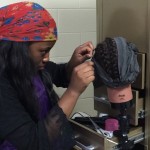New Camelot Program Making Major Strides in Helping Kids with Autism

Camelot’s campus leaders joined the Applied Behavioral Analysis department staff for the day-long training at Northwest Center for Autism: Left to Right Back row: Andrew Derwin, Michael Gurley, Nicole Davenport, Deb Singley, Jon Klavohn Front Row: ABA therapist Vicki Decker, ABA therapist Audrey Baenziger, Kay Moravek, Jennifer Johnson, Craig Reveter, Head BCBA Katie Schweizer
(DeKalb, IL-December 2, 2015) Camelot’s Therapeutic Day Schools have formed a partnership with one of the leading researchers in the field of Applied Behavioral Analysis (ABA) that is helping children on the autism spectrum learn more effectively.
Professor Mark Dixon of Southern Illinois University is the creator of a revolutionary ABA-based program called PEAK (Promoting the Emergence of Advanced Knowledge). He recently hosted a day-long training session at Camelot’s Northwest Center for Autism in DeKalb, IL.
“Many families who have a child with autism look for schools that have ABA programming,” explained Camelot VP Theresa Mortl Smith. “We launched a pilot ABA program at two of our therapeutic day schools last year for children with autism and it has been a huge success. Parents can see each week the growth on the specific skills that their child is working on. It has been similarly well received by the school districts we serve.”
Dr. Dixon designed this program so that under the direction of certified ABA-trained staff, any team member can use the curriculum once trained. That means teachers and paraprofessionals can use it one-on-one with students, with progress monitoring reviewed by Camelot’s ABA department. A child with very low cognition and very little to no language can be put on this program and show measurable growth week over week.

Camelot VP Theresa Mortl Smith believes PEAK is going to be a huge solution for children with autism.
The PEAK program is an assessment and curriculum planning guide for teaching basic and advanced language skills. The guide stems from Dr. Dixon’s interest in complex and often unobservable behavior. According to Autism Home Support Services, “PEAK is blazing uncharted trails in the ABA world.”
“We are educating all of our TDSs on this because I believe very strongly that PEAK is going to be a huge solution for so many children trying to make progress in our schools, in their homes and for their futures,” Smith says. “Just as our alternative education programs have a partnership with Jobs for the Future in forming their educational strategies and best practices, this partnership with Dr. Dixon and this program does the same for the TDS world of autism. This is the educational model for Camelot’s autism programming.”
By teaching skills well beyond those found in conventional assessment and treatment programs for children with autism, PEAK equips therapists with ways to build more complex repertoires that children need to effectively respond with und erstanding to their environment.
Last week, Dr. Dixon spent the day working with four different focus groups from Camelot TDSs. Each group was able to learn more about PEAK to bring these lessons back to their campuses. At this time, Camelot is running PEAK with 40 students with plans to continue to grow, under the direction of the ABA Dept., and specifically Camelot’s Head BCBA, Katie Schweizer.

Dr. Mark Dixon during training
“We continue to strive to make our programming better and better, so when I heard about PEAK and I started talking to Dr. Dixon last year about why it would be valuable for the population of kids we work with, I felt it would be a way to really improve the quality of our TDS programs. And that’s proven itself,” says Smith.
Camelot has invested significantly in capital and people to make its TDSs the best available option. In addition to supervising PEAK, the ABA Dept. specializes in the reduction of severe behaviors. Their specialty is to analyze the function of a child’s adverse behavior and reduce it. For example, if a child is a severe biter the ABA team can go in and analyze why the child is doing it, what stimulation they get from that behavior and then replace it with a less injurious behavior. Or they try to extinguish it completely.
“To be able to put children who are struggling at our schools into a pipeline that allows our ABA specialists to provide support and reduce severe behaviors gives us another option to better serve our students, adds Smith. “No other TDS group in Illinois is taking ABA to this level.”



